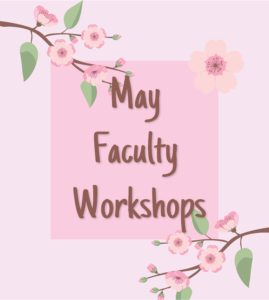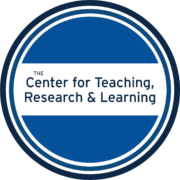2023 May Faculty Workshops Session Archive
Session Dates

Monday, May 15
Putting People on the Map: Integrating Mixed Methods and GIS for Neighborhood Mapping
10:00 a.m. – 11:30 a.m.
Presenter: Jessica Breen (Program Director, Geospatial Research Support, University Library)
This presentation showcases a mixed-methods approach to neighborhood research that centers on community perspectives and experiences. Attendees will learn how qualitative and quantitative methods were combined with GIS technology to map residents’ perceptions of their neighborhood. By prioritizing community voices, we gained a deeper understanding of the community spaces we studied. Participants will learn how to apply mapping and GIS to their own research, putting people on the map and centering voices too often left out of conversations about their communities.
Enhancing Your Qualitative Research with Digital Tools
12:30 p.m. – 2:00 p.m.
Presenter: Ashley Roccamo (Instructional Designer, University Library)
Have you ever wondered how to creatively present your research other than in written form? In this workshop, we’ll talk about a term you might have heard before: Digital Scholarship. We’ll take a look at how using digital tools and methodologies can further the scholarly conversation in creative new ways. We’ll end with information about how the AU Library can support you in enhancing your qualitative research projects with new modes of inquiry, emerging technologies, and creative digital productions.
Building a Strong Teaching Portfolio: A Guided Workshop
2:30 p.m. – 4:30 p.m.
Presenters: Hannah Jardine (Teaching & Learning Specialist, CTRL), Shed Siliman (Teaching & Learning Specialist, CTRL), Gavin Frome (Graduate Assistant for Teaching & Learning, CTRL)
Are you working on building your teaching portfolio, or considering how to get started gathering and developing the appropriate materials? Join CTRL’s Teaching & Learning Team and colleagues from across campus to discuss the purpose and components of the teaching portfolio at AU, draft an outline of your teaching statement, and develop a plan to gather evidence of self, peer, and student assessment to complete your portfolio.
Tuesday, May 16
Course Design Institute – Session 1 of 4
9:30 a.m. – 11:00 a.m.
The CTRL Course Design Institute is a series of four workshops and supplemental materials designed to support both new and experienced educators aiming to revamp an existing course, design a completely new course, or enhance their teaching practice, whether teaching in-person, online, or in a hybrid environment. By the end of the institute, you will have developed a complete course plan and additional instructional materials and ideas to implement directly into your course(s). Registration for this program indicates a commitment to attend all four workshops in the series. Read more about the course design institute and its benefits here.
Lifecycle of Research at AU
10:00 a.m. – 12:00 p.m.
Presenters: Natasha Abel (Associate Director of Communications and Media, Office of Communications), Rebecca Basu (Associate Director of Communications and Medi, Office of Communications), Susana Birdsong (Senior Grant and Contract Manager, Office Sponsored Programs), Kanako Harada (Manager of Grants & Contracts Accounting, Office of the Controller), Jennifer Maher (Director, Research Services & Communications, Office of the Provost), Bridget Mullan (Grant and Contract Manager, Office Sponsored Programs), Deominic Napoleon (Executive Director, Sponsored Research, Office of Sponsored Programs), Denitrices Trimble (Director, Grants and Contracts Accounting, Office of the Controller), Rachel Borchardt (Librarian, University Library) & Matt Zembrzuski (Senior Manager, Research Integrity, Office of Graduate and Professional Studies)
This session will share cross-disciplinary strategies for faculty to engage with the research infrastructure and university support for research at AU. Through 20-minute capsule presentations, we will cover five essential areas of support for our faculty’s research successes. Attendees will be provided with resources for scholarly communication, guidance on how to pursue foundation and corporate funding opportunities, and “in-the-know” support for research administration and integrity. Join this impactful session to prepare for new and continued research in the next academic year.
Repository Options for Your Research Data
1:00 p.m. – 2:30 p.m.
Presenters: Tiffany M. Quash (Qualitative/Survey Research Methodologist, CTRL), Rachel Borchardt (Librarian, University Library), Stefan Kramer (Associate Librarian, University Library)
Government and funder mandates, publishers, and the ideals of “open science” increasingly require scholars to make the research data they produce publicly available for purposes of replication of findings and reuse of data to answer new research questions. In this workshop, you will learn about different repositories for your research data, both inside and outside AU; considerations for choosing among them for different academic disciplines and types of data (qualitative, quantitative, etc.); and related aspects of scholarly communication.
Introduction to Assessing Bias and Equity in Measurement Models Using R
2:45 p.m. – 4:15 p.m.
Presenter: Eric R. Schuler (Senior Quantitative/Computational Research Methodologist, CTRL)
In this workshop we will discuss what bias is and looks like in measurement. We will talk through the different approaches that can be used, such as MIMIC models, measurement invariance, and differential item functioning. We will walk through the steps of conducting these analyses and the interpretations using the R statistical program. This workshop assumes some basic knowledge of R but is not required.
Wednesday, May 17
Course Design Institute – Session 2 of 4
9:30 a.m. – 11:00 a.m.
The CTRL Course Design Institute is a series of four workshops and supplemental materials designed to support both new and experienced educators aiming to revamp an existing course, design a completely new course, or enhance their teaching practice, whether teaching in-person, online, or in a hybrid environment. By the end of the institute, you will have developed a complete course plan and additional instructional materials and ideas to implement directly into your course(s). Registration for this program indicates a commitment to attend all four workshops in the series. Read more about the course design institute and its benefits here.
Are surveys dead?: Dealing with distraction, fatigue, and outright fraud in online surveys
10:00 a.m. – 12:30 p.m.
Presenters: Jane Palmer (Associate Professor, Department of Justice, Law and Criminology), Joyce Wong, (Doctoral Graduate Student, Department of Psychology), Tiffany Monique Quash (as a moderator) (Qualitative/Survey Research Methodologist, CTRL), Ericka Menchen-Trevino (Asst. Professor, School of Communication)
Online survey research has had an increase in careless responding, fraudulent responses, and situations where self-report data and behavioral data barely correlate. In this session we will share our experiences with working with online survey data, what we found has worked, issues that we are still seeing, and think through new potential options to improve data quality.
Evidence Synthesis, Systematic Reviews, and You
1:00 p.m. – 2:30 p.m.
Presenters: Clarissa Ihssen (Asst. Librarian, University Library) and Katie Hut (Asst. Librarian, University Library)
Systematic Reviews, long used in the health sciences and gaining popularity in other disciplines, are one of several methods of evidence synthesis. They allow researchers to comprehensively and systematically search across a large amount of research. While simple in theory, there is a lot of work and planning required before searching for research can commence. In this workshop, University Librarians Katie Hut and Clarissa Ihssen will prepare researchers for the rigor of this research method and describe where the library can support them during the research process.
It’s All Relative (Or Is It?): A Workshop On Outcomes, Assignments & Assessing Student Learning
3:00 p.m. – 4:30 p.m.
Presenters: Brad Knight (Senior Director, AU CORE & University College, Office of Vice Provost for Undergraduate Studies), Martyn Oliver (Faculty Chair, AU Core, Department of Critical RGC Studies), Diamond Brown (AU Core Assessment Analyst, Office of Vice Provost for Undergraduate Studies), Sarah Froonjian (Program Coordinator, Core Curriculum, Office of Vice Provost for Undergraduate Studies)
On paper, course mapping makes sense: assignments align neatly to outcomes, and provided students complete their work, there will have been opportunities to practice and achieve the learning we desire. But, if we’re honest, many of us would probably admit to a fuzzier sense of student progress in our courses and so assessment seems hard to get our arms around. Content acquisition is one thing, but inquiry-based habits of metacognition seem harder to confirm. In this session, we’ll model one professor’s attempts to take on this challenge before turning the tables and getting participants involved in strategizing how they can methodically investigate what students have learned.
Thursday, May 18
Course Design Institute – Session 3 of 4
9:30am – 11:00 a.m.
The CTRL Course Design Institute is a series of four workshops and supplemental materials designed to support both new and experienced educators aiming to revamp an existing course, design a completely new course, or enhance their teaching practice, whether teaching in-person, online, or in a hybrid environment. By the end of the institute, you will have developed a complete course plan and additional instructional materials and ideas to implement directly into your course(s). Registration for this program indicates a commitment to attend all four workshops in the series. Read more about the course design institute and its benefits here.
Designing Authentic Assessments
1:00 p.m. – 2:30 p.m.
Presenters: Adam Tamashasky (Complex Problems Faculty Chair and Hurst Senior Prof Lecturer, Department of Literature) and Rebecca Comfort (Manager, Complex Programs Seminar Program, Office of Vice Provost for Undergraduate Studies)
Authentic assessment challenges us as faculty to get creative, thinking beyond traditional essays and exams to consider the “real-world” scenarios where students will implement a course’s lessons and techniques. In this workshop aimed at current and future Complex Problems Faculty Fellows, we’ll collectively brainstorm on authentic assessment possibilities for each of the Complex Problems learning outcomes.
Student Perspectives on Equitable and Inclusive Teaching at AU
3:00 p.m. – 4:15 p.m.
Presenters: Gavin Frome (Graduate Assistant for Teaching & Learning, CTRL), Reba Mathews (Undergraduate Partner for Teaching & Learning, CTRL), Kimiya Parker-Hill (Undergraduate Partner for Teaching & Learning, CTRL), Alli Sattler (Undergraduate Partner for Teaching & Learning, CTRL) Nathaniel Smith, Undergraduate Partner for Teaching & Learning, CTRL), Hannah Jardine (Teaching & Learning Specialist, CTRL)
In this session, undergraduate students will share their perspectives on how instructors at AU can make their teaching more impactful, equitable, and inclusive. These students have been working with CTRL as undergraduate assistants in teaching and learning throughout the spring semester and are excited to share insights from their focus projects with the larger AU community. Their presentations will draw on personal experience, interactions with other students, and ideas from coursework, and include topics related to accessibility, student participation, power and privilege, and the educator-student dynamic.
Friday, May 19
Course Design Institute – Session 4 of 4
9:30 a.m. – 11:00 a.m.
The CTRL Course Design Institute is a series of four workshops and supplemental materials designed to support both new and experienced educators aiming to revamp an existing course, design a completely new course, or enhance their teaching practice, whether teaching in-person, online, or in a hybrid environment. By the end of the institute, you will have developed a complete course plan and additional instructional materials and ideas to implement directly into your course(s). Registration for this program indicates a commitment to attend all four workshops in the series. Read more about the course design institute and its benefits here.
Tuesday, May 23
Community-Based Learning & Research (CBLR) Faculty Institute: Being a Part of DC, not Apart from DC
10:00 a.m. – 4:00 p.m.
Presenters: Marcy Campos (Director, Center for Community Engagement & Service), Saagar Gupta (Program Coordinator, Community-Based Learning, Center for Community Engagement and Service) & Amanda Choutka (Senior Professorial Lecturer, Department of Literature and Faculty Fellow, Center for Community Engagement & Service)
This session focuses on (re)designing a course syllabus to incorporate Community-Based Learning & Research (CBLR), a pedagogy that deepens student learning through collaboration with a nonprofit or school in the DC area. This “high impact practice” advances AU’s Strategic Plan and helps students better understand issues that impact local residents and organizations. Participants will discuss best practices and challenges for collaboration with community partners, compare direct service, project-based work, and community-based research, and explore ways to incorporate critical thinking and reflection.

